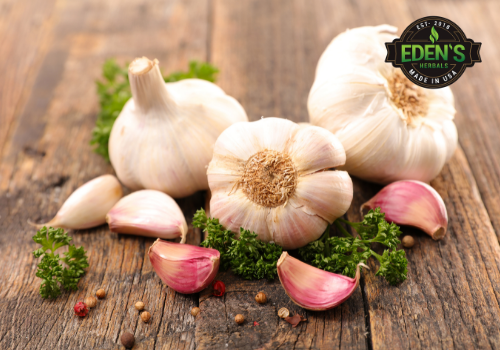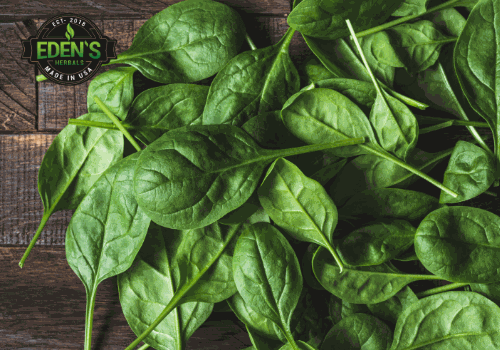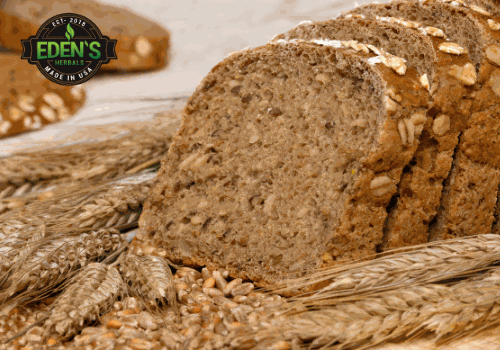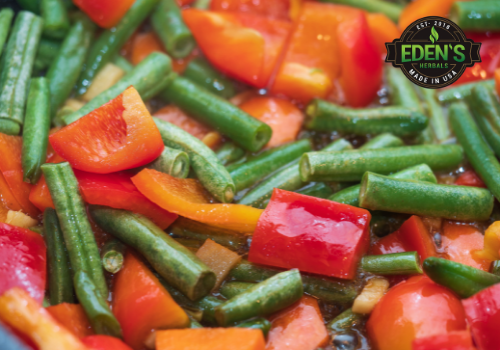 Since the start of the pandemic, staying healthy has become a top priority.
Since the start of the pandemic, staying healthy has become a top priority.
If you're striving to get back out into the world, get some exercise and increase your resistance to illness, it's important to focus on fighting inflammation and shedding toxins.
While a diet rich in immune-supportive foods can't reduce your risk of getting a virus, particularly a novel virus, you can protect yourself against secondary infections and other illnesses with a diet that protects your immune function.
Here are our 7 favorite foods for naturally boosting your immune system among other health benefits!
1) Blueberries
The benefits of blueberries, whether fresh, dried and frozen, are well-documented. One of the most effective compounds found in blueberries is a flavonoid called anthocyanin. Anthocyanin offers antioxidant properties that can grab up the free radicals that are traveling through your tissues and causing damage.
Through the processes of living, from digestion to breathing to generating waste, we break down large molecules into smaller ones. This breakdown can lead to the release of unattached electrons, or free radicals. When free radicals attach to your tissues, they cause damage. A diet rich in antioxidants will include deeply colored fruits and vegetables like blueberries. Antioxidants protect your tissues from that damage.

2) Garlic
For best results, fresh, raw garlic is best for protecting your immune system. However, raw garlic can be tough on your stomach. If you don't care for the odor inherent in garlic or if your stomach really can't tolerate it, you may have better luck using roasted garlic and garlic oil.
Making your own garlic and garlic oil will result in fragrant, delicious oil that you can cook with as long as you use it within about 3 weeks. Garlic oil can also be drizzled on a salad or toasted whole grain bread. Garlic mash can be separated out and spread on pizzas, placed on roasting meats or served with pasta.
3) Ginger
Ginger is a tremendous source of Vitamin C. Additionally, ginger has remarkable anti-inflammatory properties and can reduce your risk of heart disease, osteoarthritis inflammation and even high cholesterol.
If you're struggling to lose weight, consider adding ginger tea to your usual snack time. Pair sliced ginger with a bit of meat to balance salt and fat. There's a reason that sushi is served with sliced fresh or pickled ginger; that citrus zing cuts through the sticky starch of rice and the rich fat of the fish.
 4) Spinach
4) Spinach
Spinach isn't just Popeye's go-to for strength. In addition, you need spinach for beta-carotene, a crucial antioxidant. Spinach is also a wonderful source of folate, which is needed for a quicker immune response. If you've ever had a cold turn into bronchitis, you know how important it is to get on top of a cold quickly.
If you don't like raw spinach, you can still enjoy it. Cooked spinach is a wonderful addition to quiches, omelettes, and as a lasagna filler. Frozen spinach can easily be enhanced with hearty mushrooms and a bit of garlic; try stewing it to save all the flavor in the liquid that will escape as you heat up your spinach.
5) Salmon
Keeping your Vitamin D levels high is an excellent way to protect yourself from an inflammatory response to viruses and bacteria. You may choose to take a supplement, but you can also increase your Vitamin D intake with fortified dairy products and orange juice.
Additionally, consider increase your intake of sardines, tuna, mackerel and salmon. These four fish products are known as "fatty" fish and many can find this flavor unpleasant. Additionally, canned sardines can be quite high in sodium while canned mackerel can have an unpleasant odor when you open the can.
To avoid this, consider purchasing single fillets of flash frozen salmon. These single fillets can be easily thawed and cooked quickly in just a bit of oil to keep down the fatty flavor of the flesh. Cooked with a bit of lemon or dill, most salmon fillets can be quite tasty without the unpleasant aspects of other fatty fish, like mackerel and sardines.
 6) Whole Grains
6) Whole Grains
The benefits up whole grains come from deep inside the gut. Changing up your grain intake means that your gut develops a more varied collection of bacteria.
Having a poor variety of health gut bacteria can lead to inflammation. This inflammation limits your gut in many ways. You won't absorb as many nutrients from what you eat may develop blockages or tight passages within the gut could develop sores or ulcers along the gut.
Keeping your gut well-supplied with whole grains will improve the efficiency of your evacuation. If you struggle with constipation or irregularity in any form, take a look at the amount of white flour, white rice and instant oats you ingest every week.
7) Eggs
Eggs get a bad rap as the yolks contain a lot of cholesterol. If you have high cholesterol, you may need to toss the yolks from every other egg and just use the whites. However, eggs are a terrific and cheap source of protein. They're also loaded with Vitamin A, zinc and selenium.
Properly prepared, eggs can be a terrific foil for many other foods. Scrambled eggs with a bit of cheese are tasty, but an egg omelet loaded with fresh spinach, mushrooms, broccoli and bell peppers is a feast of flavor and terrific health. Egg dishes can also be easy on your budget and your schedule; check out the make-ahead breakfast casseroles that you can prep in the evening and bake up quickly in the morning to reduce your risk of faster, more unhealthy choices.
 Final Thoughts
Final Thoughts
Eating foods that support a healthy immune system is a no-brainer, but it can also be easier on your food budget. To keep your expenses down and protect your schedule, look for cook ahead tools for your whole grains. Consider doing some baking with those fresh blueberries; whole grain pancakes and muffins can be flavorful and healthy as long as you can stay away from too much sugar.


